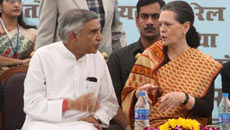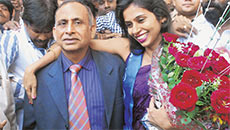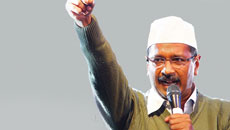Be it a Metro train or a tea stall, drawing rooms to restaurants, market gossip to office banter, politics has undoubtedly become the main topic of social conversation in a politically conscious India.
With hardly a month to go for the Lok Sabha elections to begin, poll fever has gripped the people with even dinner table and drawing room talk zeroing in on who will be India's next prime minister in what is widely expected to be one of the most closely-contested and unpredictable polls in independent India's history.
With the Lok Sabha elections starting April 7, and the polls in the national capital on April 10, animated discussions and, on many occasions, heated arguments can be heard in buses, Metro trains, tea stalls and even drawing rooms as people argue over their political heroes, present their analyses and forcefully make their predictions.
As the media, especially television channels, has raised the political pitch in the country, it does not look odd when even a stranger asks you: "Who will you vote for, Narendra Modi, Rahul Gandhi or Arvind Kejriwal?"
Sixty-five-year-old Usha Kaushal said even in kitty parties, the talk usually veers to either the Bharatiya Janata Party's prime ministerial candidate Narendra Modi or Congress vice president Rahul Gandhi or the AAP leader.
"It has never happened before that women, who usually love gossiping or talking about their daughters-in-law or food, are now discussing the future of the country. In fact, the other day, a new person had joined our party. Instead of talking about herself, she was busy airing her political views. Politics has certainly become an ice-breaker between strangers," Kaushal, a grandmother of two, told IANS.
She said the talk in kitty parties is increasingly on politics and the coming elections.
Sachin Sharma, who works for an NGO, said he mostly travels by the Metro, and on many occasions in buses, and is surprised when random strangers start talking about politics.

"I will say the poll fever has touched the common man too. Imagine, it is like a discussion on the weather. I am surprised when people air their political views so openly. In a way it is good that more and more people want to be part of the election process. It speaks well of India as the world's largest democracy," Sharma added.
For first-time voter Sanjana Tripathi, it will be an exciting prospect to cast her ballot. This time, over 23 million voters are aged between 18 and 19 years.
"These days, especially during dinner time, we watch news channels. Earlier, we used to watch our favourite soap operas. In our house, we have different political affiliations. My father votes for BJP and my mother for the Congress. But I think I will vote for Kejriwal. I am for change," said Tripathi, who added that most of her friends are planning to vote for AAP.
She said she is also trying to convince her mother to vote for AAP.
"My mother had recently held a kitty party at our house. I seized that opportunity to convince some of her friends to vote for AAP. At one point, I had a heated discussion with my mother. But politics is like that..But I am sure I was able to persuade some her friends to vote for AAP," Tripathi told IANS.
Sanjay, a tea-stall owner at Palam in southwest Delhi, said with Modi's campaign called 'chai pai charcha' or discussion over tea, the humble outlets have become a hotspot to discuss politics.
"A tea-stall is one place where politics is one discussion that always happen. But it has become the symbol with Modi's campaign. A tea-stall is also a place where one can judge the mood of the people. I can say at least in Delhi, many people will vote for AAP. I can't say who will become India's prime minister. But I am told that there is a Modi wave. I don't know..there could be. At least that is what the television channels are saying," Sanjay contended.
Architect Sandeep Rao said he lives in a joint family and his house these days matches the mood of the nation.

"We eat, sleep and drink politics these days. Even during dinner time, we discuss politics. Discussions help in forming views and decisions. We were earlier supporting a particular political party, but now we are supporting a party that has just entered the political arena."
Added his elder brother Santosh, an engineer: "Elections have always been interesting. But this time round for the first time, a new party is being talked about. For now, nothing can be said who will form the government. But the suspense is thrilling and nail-biting."






